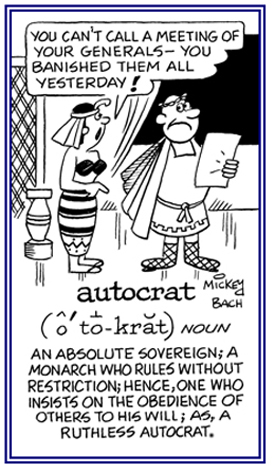auto-, aut-
(Greek: self, same, spontaneous; directed from within)
autoclastic
A reference to rock which has been fragmented in place as a result o mechanical processes or orogenic (mountain formation) forces .
autoclastics (adjective)
1. Broken in place, said of rocks having a broken or brecciated (rocks with sharp-angled fragments) structure due to crushing, in contrast to those of brecciated materials brought from a distance.
2. Of rock, fragmented in place by folding due to orogenic forces when the rock is not so heavily loaded as to render it plastic.
2. Of rock, fragmented in place by folding due to orogenic forces when the rock is not so heavily loaded as to render it plastic.
autoclave (verb), autoclaves; autoclaved; autoclaving
1. Using a strong, pressurized, steam-heated vessel, as for laboratory experiments, sterilization, or cooking.
2. Operating a device for heating substances above their boiling point; used to manufacture chemicals or to sterilize surgical instruments.
3. To place into or to put into an autoclave.
2. Operating a device for heating substances above their boiling point; used to manufacture chemicals or to sterilize surgical instruments.
3. To place into or to put into an autoclave.
1. An automatically regulated apparatus for the sterilization of objects by steam under pressure.
2. A device for heating substances above their boiling point; used to manufacture chemicals or to sterilize surgical instruments.
2. A device for heating substances above their boiling point; used to manufacture chemicals or to sterilize surgical instruments.
Autoclip
A surgical clip applied with an automatic staple. It is usually employed for wound closure in place of a suture.
This is a proprietary name (the patented brand name or trademark under which a manufacturer markets a product).
autocode (s), autocodes (pl); automatic code (s), automatic codes (pl)
The process of using a computer to convert automatically a symbolic code into a machine code.
autocoid
An organic substance; such as, a hormone, produced in one part of an organism and transported by the blood, lymph, or sap to another part of the organism where it exerts a physiologic effect on that part.
autocollimation
In optics, the process used in an autocollimator.
autocollimator
An instrument combining the functions of a telescope and a collimator for detecting and measuring very small deviations in a beam of light. A collimator is a fixed telescope for use in collimating or adjusting the line of sight (of a telescope).
autocoprophage, autocoprophagous, autocoprophagy
1. A reference to an organism that consumes its own feces.
2. The action of an organism that eats its own excretion.
2. The action of an organism that eats its own excretion.
autocorrelation
In statistics, a property displayed by some sequences of adjacent items not being independent of each other.
Autocorrelation is a mathematical tool used frequently in signal processing for analyzing functions or series of values; such as, time domain signals. It is the cross-correlation of a signal with itself.
Autocorrelation is useful for finding repeating patterns in a signal; such as, determining the presence of a periodic signal that has been buried under noise, or identifying the fundamental frequency of a signal which doesn't actually contain that frequency component, but implies it with many harmonic frequencies.
A form of government in which a country is ruled by one person, or group, with total power or unrestricted control over all of the other citizens: An autocracy involves a system in which someone makes decisions which are subject to neither external legal restraints nor regularized mechanisms of popular control.
1. A monarch of uncontrolled or unrestricted power; one who rules with undisputed jurisdiction: The new owner of the company Jake worked for was an autocrat who demanded absolute obedience by his employees.
2. A person who is invested with or assumes unlimited authority with any relationship: Adam's daughter, Susan, called him an unreasonable autocrat.

© ALL rights are reserved.

© ALL rights are reserved.
Go to this Word A Day Revisited Index
2. A person who is invested with or assumes unlimited authority with any relationship: Adam's daughter, Susan, called him an unreasonable autocrat.
The state! It is I!


Go to this Word A Day Revisited Index
so you can see more of Mickey Bach's cartoons.
autocratic (adjective), more autocratic, most autocratic
Of the nature of, or pertaining to someone who has absolute authority; referring to a despotic ruler: A few autocratic rulers in the past were Adolf Hitler, Napoleon Bonaparte, and Queen Elizabeth I. Today Vladimir Putin is considered to be an autocratic leader.
autocratical, autocratically
In autocratic manner, absolutely, despotically.


